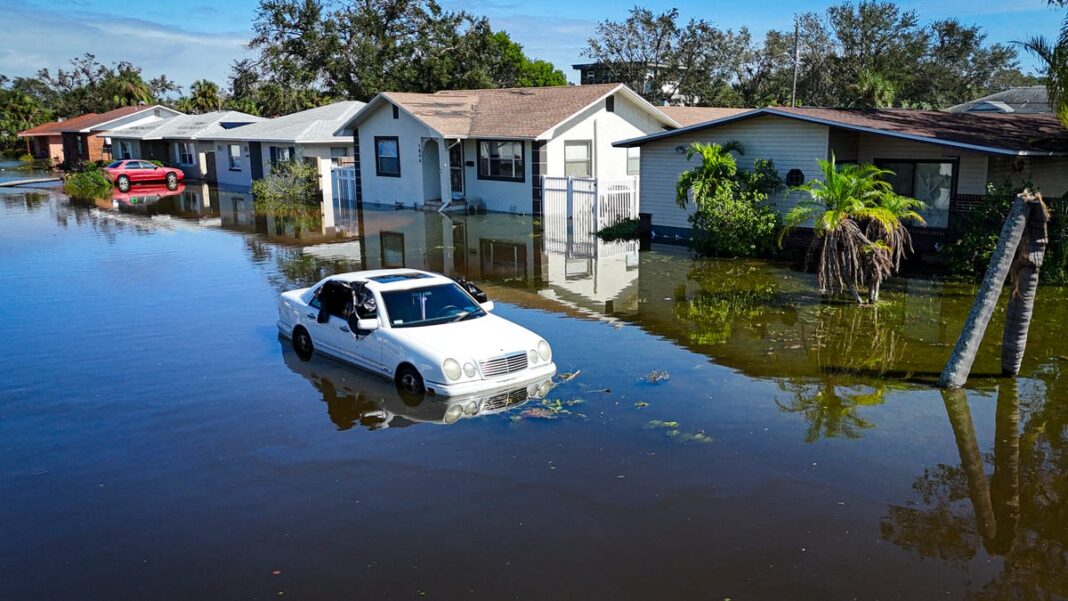Will Congress return to DC quickly to approve funding for Hurricane Helene and Milton? Here’s what you should know.
WASHINGTON – Just after Hurricane Helene hit the Southeast, Florida faced the wrath of another hurricane—Hurricane Milton.
The consecutive storms have put a strain on disaster relief agencies, leading President Joe Biden to urge Congress to act swiftly to provide emergency funding, particularly to assist small businesses devastated by these hurricanes.
Biden and several bipartisan lawmakers have suggested that Congress should reconvene early to secure additional funding. However, it seems unlikely that this will occur before the November elections, as lawmakers are scheduled to be on recess to engage with constituents until Election Day.
Moreover, emergency management officials are not only advocating for increased funding. The Federal Emergency Management Agency (FEMA) has raised concerns about misinformation, which could deter survivors from seeking help.
Here’s what you need to know.
What actions has Congress taken so far?
Last month, Congress approved a measure that continues FEMA’s current funding level of $20 billion until December 20. It also provided the agency with enhanced flexibility to disburse funds if necessary.
However, this legislation did not allocate any additional funds for FEMA or the Small Business Administration, which had been requested by the White House and Congressional Democrats for long-term recovery efforts from other disasters, including the severe wildfires that affected Maui last year.
What does FEMA currently require?
Officials at FEMA have not specified how much additional funding they need for long-term disaster recovery. However, they have confirmed sufficient short-term resources to assist survivors. President Biden projected that rebuilding after the two hurricanes will cost “several billion dollars.”
According to Homeland Security Secretary Alejandro Mayorkas, “We have the resources to meet the immediate needs of those affected by Hurricane Helene and Hurricane Milton,” as well as the associated tornadoes. “However, we will require additional funding” once Congress returns.
FEMA Administrator Deanne Criswell mentioned that the agency utilized approximately $9 billion of the $20 billion budgeted for the remainder of the year within just one week, prior to Milton’s impact on Florida. This rapid spending was partly due to reimbursing states for earlier disasters.
Meanwhile, misinformation and conspiracy theories about FEMA’s funds are circulating, including claims that the agency lacks adequate resources for hurricane victims or that only $750 is available per person. FEMA and lawmakers from impacted regions have debunked these notions.
Criswell recently addressed false allegations made by former President Donald Trump regarding recovery efforts after Hurricane Helene, countering claims that there were no “helicopters or rescues” in North Carolina. She emphasized that such misinformation is “creating distrust in both the federal and state governments,” affecting the efforts of the many first responders working tirelessly to assist these communities.
What about other essential resources?
Another vital source of disaster relief funding is facing challenges.
The Small Business Administration (SBA) is projected to run out of funds “within weeks” unless Congress intervenes, President Biden indicated in a letter to congressional leaders on Friday.
The SBA supports businesses following disasters and also provides individuals with loans to repair their homes or personal property. According to Biden, SBA loans often represent the primary source of federal disaster recovery funding for individuals.
Currently, the agency is receiving around 3,000 applications daily from those affected by Helene and is likely to need an additional $1.6 billion to continue its operations through the year.
SBA Administrator Isabel Casillas Guzman stated, “We look forward to collaborating with Congress to secure the necessary federal resources so that the SBA can continue to provide affordable disaster loans for homeowners, renters, small businesses, and nonprofits. Americans should not have to wait for crucial assistance when they need it most.”
What are lawmakers’ intentions?
On Thursday, President Biden mentioned to reporters that Congress “needs to reconvene to address emergency requirements swiftly,” highlighting they will need to return after the elections as well.
A significant number of legislators, including 60 Democrats along with several bipartisan senators and House Republicans whose states were impacted by Hurricane Helene, have emphasized the importance of coming back earlier.
However, House Speaker Mike Johnson, R-La., has not indicated any intention to bring lawmakers back for a vote at this time.
During a press briefing in North Carolina on Wednesday, Johnson pointed out that FEMA has disbursed only 1% of the funds allocated during September’s extension.
He asserted, “FEMA and the current administration have the necessary resources to tackle immediate needs.”
Johnson further explained that it’s the responsibility of state and local authorities to evaluate the extent of the damage and identify the federal assistance they require.
“Following that, Congress will take action,” he noted. “Unfortunately, these assessments will take some time.”

